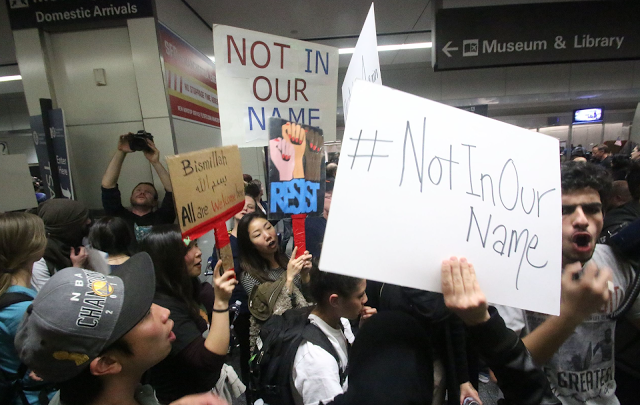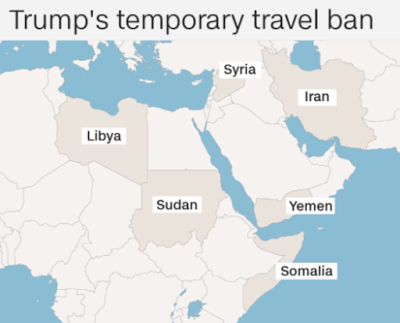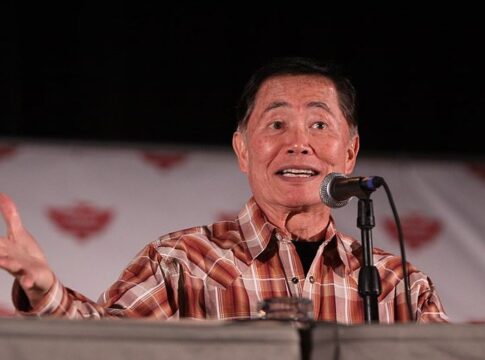
By Ed Diokno
Views from the Edge
No matter how you try to couch it, yesterday’s “new” Executive Order restricting travel from six Muslim-dominated countries is still a Muslim ban.
The executive order signed by Mr. Trump is being called “Muslim Ban 2.0” by its critics.
“This replacement order is the same hate and fear with new packaging,” explained Amnesty International executive director Margaret Huang. “It will cause extreme fear and uncertainty for thousands of families by, once again, putting anti-Muslim hatred into policy. No amount of editing can make this executive order anything but what it is – blatant bigotry. There are real threats to security, but this bigoted order will do nothing to make the country safer”
The new executive order unveiled today is supposed to be more defensible than the first EO signed last January. The constitutionality of that deeply flawed earlier order is being challenged by the courts after lawsuits were filed in Washington state. The new EO makes moot all the legal challenges against it.
LATEST STORIES
The new EO will still halt admissions to the U.S., effective March 16, of nationals from six Muslim-majority countries (Iran, Libya, Somalia, Sudan, Syria, and Yemen) for at least 90 days (Iraq is no longer included in the travel ban.) It replaces the Jan. 27 travel ban that suspended the immigrant and non-immigrant entries of individuals of seven Muslim-majority countries. Civil rights organizations and state attorney generals have vowed to challenge the new order but the new order, which was vetted and designed to meet the legal standards may be more difficult to undo.
“The Trump administration has conceded that its original Muslim ban was indefensible,” said Omar Jadwat, director of the ACLU’s Immigrants’ Rights Project. “Unfortunately, it has replaced it with a scaled-back version that shares the same fatal flaws. The only way to actually fix the Muslim ban is not to have a Muslim ban. Instead, President Trump has recommitted himself to religious discrimination, and he can expect continued disapproval from both the courts and the people.
“What’s more, the changes the Trump administration has made, and everything we’ve learned since the original ban rolled out, completely undermine the bogus national security justifications the president has tried to hide behind and only strengthen the case against his unconstitutional executive orders.”

Besides dropping Iraq among the targeted countries, other major changes of the new travel restrictions include:
- dropping current visa and green card holders from the ban;
- dropping Iraq from the list of targeted countries;
- dropping the language that would favor Christians over Muslims;
- reducing the total number of refugees allowed into the U.S.
While the new EO was being drafted, Trump’s own Department of Homeland Security issued a study that concluded that terrorists could not be predicted on the basis of national origin and that refugees were not radicalized when they first entered the country.
“This order has nothing to do with national security, and everything to do with encouraging fear of Muslims,” said Rep. Judy Chu, chair of the Congressional Asian Pacific American Caucus (CAPAC).
“Omitting one country from the list does not eliminate the need to provide the American people with meaningful evidence supporting this ban,” agreed Sen. Kamala Harris, D-Calif. “The White House had more than a month to develop their case, and has failed to provide actual justification based on facts.
“The tweaks made today do not make this order any less unconstitutional or immoral than the last,” said Chu. “No individual from any of the countries named in this order has committed an act of terror in the United States. And worse, he’s particularly targeting refugees – some of the most vulnerable and least dangerous people in the world.
“If President Trump truly wants to make America safer, he will drop this fanatical and ideological war against Islam, stop his plans to gut the budget of the State Department, and listen to the advice of national security and law enforcement officials who have warned against isolating the Muslim community in this way. As it stands, this updated order is still a policy of cruelty and bigotry and I will continue to resist it as an elected Representative and as an American citizen.”
Other AAPI lawmakers and advocacy organizations weighed in their opposition to the ban:
“The Trump Administration’s repackaging is merely a second attempt to revise his unconstitutional policy. This is the same ban, driven by the same hazardous discrimination that weakens our ability to fight terror. Revised language won’t change what this executive order is: an act that prohibits people from entering the U.S. based on their religion or refugee status. The public and courts rejected the Trump administration’s first attempt at this, and it must do so again.” – Rep. Ro Khanna, D-Calif.
“This scaled-back order represents a partial victory for Americans fighting for the rights of immigrants in the U.S. and directly responds to several immigration cases and scenarios brought forward in CAIR’s anti-ban lawsuit. As White House Adviser Steven Miller promised, this watered-down ‘Muslim Ban 2.0’ was retooled to achieve the same unconstitutional policy outcome as the first deeply-flawed order. We believe this desired policy outcome is in fulfillment of now-President Trump’s campaign pledge to ban Muslims from entering the U.S. This order stills stigmatizes the faith of Islam and Muslim. It does not make America any safer, but does make America LESS great. – Council on American-Islamic Relations (CAIR)
.@RealDonaldTrump may have repackaged it but his new executive order is still a #MuslimBan. Just as cruel & un-American as the first one. pic.twitter.com/ZomgtsYe1T
— Grace Meng (@RepGraceMeng) March 6, 2017
“As the country closes the door on immigrants and refugees, our communities and allies have a responsibility to resist and fight back against these attacks. The struggle against the growing anti-immigrant, anti-Black/Brown, and anti-Muslim sentiment needs to happen both nationally and locally because we know we’re better than this. We stand by our immigrant, refugee, and Muslim communities and all people of color who are impacted by these hateful policies, and we will not stand down. To remain silent is to be complicit in this institutionalized form of hate.” – Asian Pacific American Labor Alliance, AFL-CIO (APALA)
“[The President] made some small changes…but it’s still basically a Muslim ban. It’s still a ban based on one’s religion, and every time our country has targeted a minority group for discriminatory treatment, we have been proven to be very, very wrong, and the President is wrong in this instance.” – Sen. Mazie Hirono, D-Hawaii
AsAmNews is an all-volunteer effort of dedicated staff and interns. You can show your support by liking our Facebook page at www.facebook.com/asamnews, following us on Twitter, sharing our stories, interning or joining our staff.








